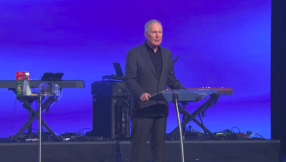The rebuttals have begun as they inevitably would.
The authors of the Nashville Statement knew outrage, hostility and counter-statements would be the result. They knew it would elicit rebukes and draw harsher boundaries. Perhaps that was their intention.
There are now multiple retorts to the new evangelical manifesto, signed by more than 150 conservative Christian leaders and coming out of the Southern Baptist Convention's annual conference.

It offers a comprehensive conservative position on sexuality, using harsher language and drawing tighter dividing lines than before. Such is it forthrightness than a number of conservative Christian leaders have come out rejecting the statement.
But a quick scan of the original signatories to this new series of affirmations and denials begs the question – why bother?
It is a hall of fame for reformed Protestantism. For anyone familiar with the church's debate over sexuality, there is no ambiguity over where the likes of Russell Moore, John Piper, JI Packer, James Dobson, Wayne Grudem, Don Carson and RC Sproul stand on gay relationships. And for anyone unfamiliar who wanted to know, less than five minutes Googling would tell them more than they needed to know.
Piper justifies the intervention by claiming it offers 'precious clarity on human sexuality'. By which he means 'precious clarity' about where he and his colleagues stand on human sexuality.
But there is nothing shocking or new to be learnt from the list of people who have backed this statement.
The only conceivable reason why they felt it necessary to restate their already expressed opinions is because they feel threatened. Like an injured animal backed into a corner, they are fighting all the harder.
Perhaps nearly a year into Trump's presidency evangelicals realise a political answer to their moral concerns is fruitless. Perhaps with more and more high profile Christian teachers confessing their ambiguity or openness to gay relationships, they feel a dwindling influence.
And so the result is drawing the net of what they see as orthodoxy even tighter.
In the preamble explaining the need for the statement, the signatories turn against anyone sitting on the fence or unwilling to make a public statement against homosexuality. For them, unless you explicitly rejecting gay relationships it is no longer good enough.
'We are persuaded that faithfulness in our generation means declaring once again the true story of the world and of our place in it—particularly as male and female,' they write. 'This is the path not only of glorifying God, but of knowing ourselves. To forget our Creator is to forget who we are, for he made us for himself. And we cannot know ourselves truly without truly knowing him who made us.'
Then they go on to exclude conservative Christians who admit to being gay but who chose to live celibate lives because they believe that is what the Bible says.
Article 7 of the statement reads: 'We deny that adopting a homosexual or transgender self-conception is consistent with God's holy purposes in creation and redemption.'
'For intellectual reasons, I cannot sign the Nashville Statement,' says David Bennett, a gay celibate Christian.
'Homosexual experience and identity needs to be listened to, understood and a new identity developed in Christ that can incorporate that reality in celibacy or interorientation marriage without leading to sinful realities like SSM marriage, forced marriages that are not given by grace or legalistic celibacy,' he says.
' I am deeply disappointed with the lack of conversation around this statement and it shows a failure to understand the anthropology of repentant SSA [same-sex attracted] / gay people who choose to identify with the LGBTQI community on the level of their plight in 76 nations where it is illegal and 7 where they can be executed and the incredible pain they go through, including the plight of thousands of refugees fleeing because of this from Russia, the Middle-east etc. This statement falsely makes the narrow path Jesus has designed pharisaically narrower. This is not Jesus' way. I vote no.'
The only tangible difference this statement makes then, other than causing immense amounts of pain and harm to gay Christians and gay people considering Christianity, is to tighten the boundaries of perceived orthodoxy even closer around a smaller and smaller group of people.
It doesn't clarify where the signatories stood. That was already clear. It doesn't help offer 'clarity' as John Piper says, because as the signatories well know such a statement will only ever cause more heat than light.
So as the wounded and weakened animal of reformed evangelicalism thrashes with increasing viciousness, the question remains – what is the point?













